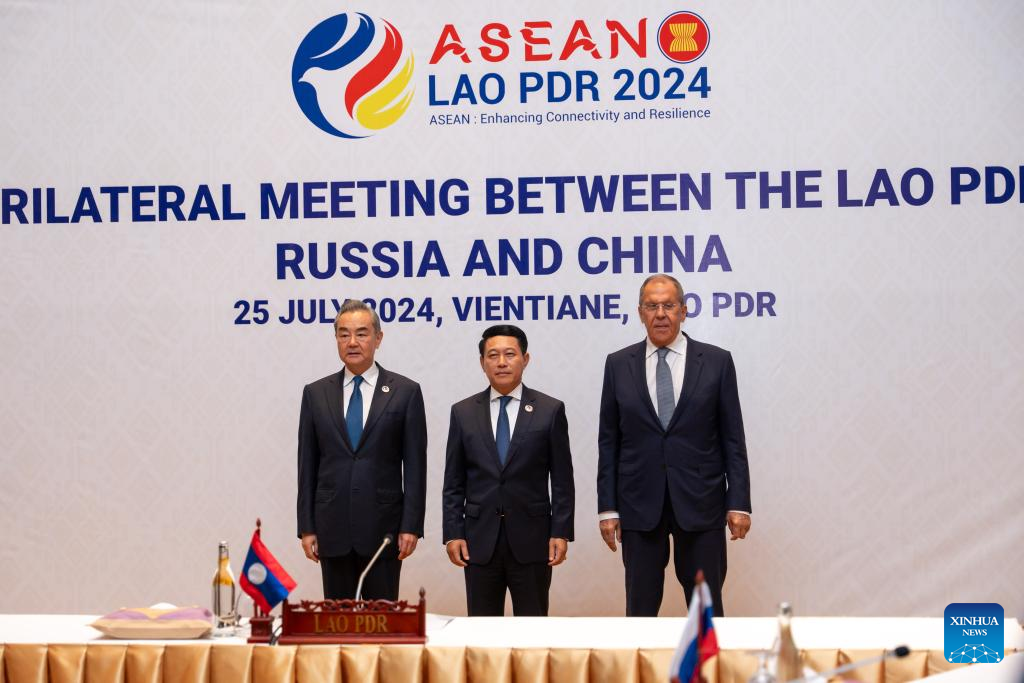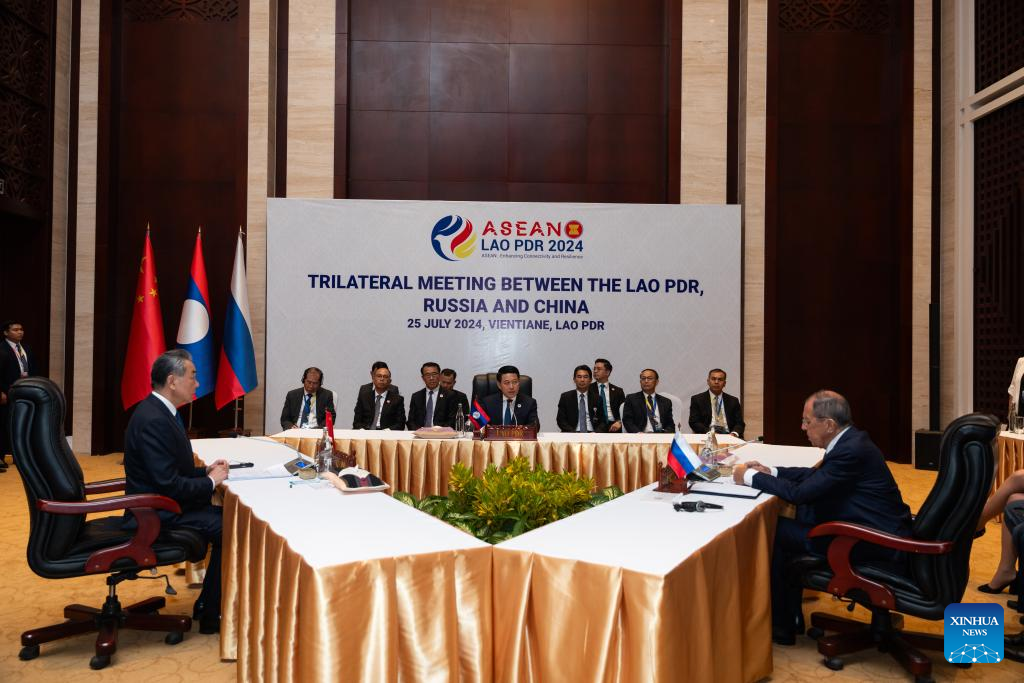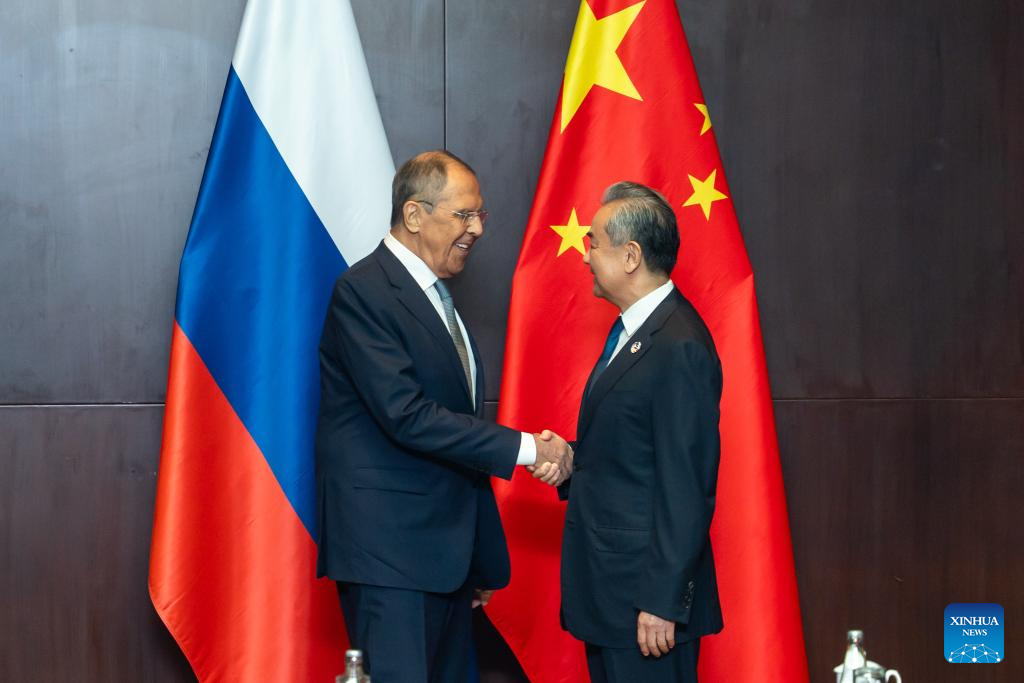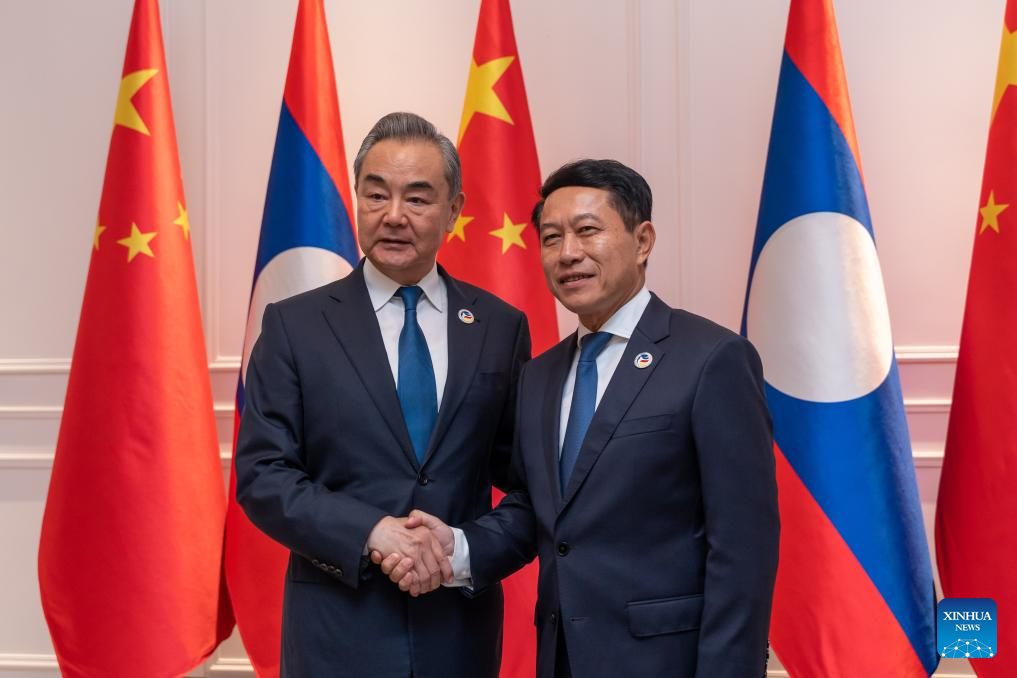
Chinese Foreign Minister Wang Yi, also a member of the Political Bureau of the Communist Party of China Central Committee, Russian Foreign Minister Sergey Lavrov and Lao Deputy Prime Minister and Foreign Minister Saleumxay Kommasith attend a trilateral meeting in Vientiane, Laos, July 25, 2024. The meeting was chaired by Saleumxay. (Photo by Kaikeo Saiyasane/Xinhua)
VIENTIANE, July 26 (Xinhua) -- China, Russia and Laos on Thursday pledged to enhance cooperation to safeguard the common interests of the three countries, contributing to regional stability, prosperity and response to risks and challenges.
Chinese Foreign Minister Wang Yi, Russian Foreign Minister Sergey Lavrov and Lao Deputy Prime Minister and Foreign Minister Saleumxay Kommasith made the remarks during a trilateral meeting in the Lao capital Vientiane, where a series of meetings of foreign ministers of southeastern and eastern Asian countries are being held.
At the trilateral meeting, Wang, also a member of the Political Bureau of the Communist Party of China Central Committee, highlighted a world of accelerating changes unseen in a century, with new turbulences ahead, a transforming international system, and a sluggish global economic recovery.
He cited rising hegemonism, unilateralism and protectionism, and the undercurrents of "small courtyard and high wall" and "decoupling and breaking chains," coupled with persisting regional conflicts as among pervading destabilizing, uncertain and unpredictable factors around the world.
However, the Chinese foreign minister emphasized peace, development, cooperation and mutual benefit remain the common aspiration of the people of the international community, with world multipolarity, economic globalization and democracy in international relations still being the major trend of today's world.
Wang said the Global South is growing and emerging powers are rising inexorably, noting strengthening regional cooperation, promoting integrated development and practicing multilateralism are the common aspirations of countries while building a community with a shared future for mankind presenting a brighter prospect.
Wang stressed China, Russia and Laos as emerging economies in the Asia-Pacific region and as constructive forces for regional peace and development, as well as the fact that they are the current rotating chairs of the Shanghai Cooperation Organization (SCO), BRICS group and the Association of Southeast Asian Nations (ASEAN), respectively.
Enhancing cooperation among the three countries will not only help safeguard their common interests, but also send a clear message of solidarity and cooperation among regional countries joining efforts to promote regional stability and prosperity and cope with risks and challenges, he said.
China speaks highly of Laos' chairmanship of ASEAN and stands ready to work with Russia to support the ASEAN-centered regional cooperation architecture and support Laos and ASEAN countries in keeping East Asia cooperation on the right track, Wang said.
Agreeing to China's insights into the international situation, Lavrov and Saleumxay said the three countries have shared stances and views on many major issues.
According to the two foreign ministers, Russia and Laos are willing to strengthen communication and coordination with China, consolidate political mutual trust, and plan for future cooperation in forming greater synergy to safeguard the common interests of the three countries as well as regional countries.
During their meeting, the three sides spoke highly of the fruitful outcomes of high-quality Belt and Road Initiative (BRI) cooperation, pledging to push for synergy between the BRI and development strategies of the Eurasian Economic Union and ASEAN, creating more growth areas for cooperation to revitalize regional integration.
They vowed efforts to forge a closer connectivity partnership, with the help from a high-quality two-way operation of China-Laos Railway and China-Europe Express that enables a railway corridor linking Russia, China's Manzhouli, Chengdu, and Kunming, Laos' Vientiane and Thailand's Bangkok, including expanding and upgrading supporting industries, and maintaining stable and smooth industrial and supply chains.
The three sides expressed concerns over non-regional forces fanning fires in the Asia-Pacific region, and the willingness to step up coordination and cooperation to cool down hotspot issues in maintaining regional security and stability.
They agreed to jointly oppose power politics, to resist camp confrontations, to practice multilateralism and to safeguard international fairness and justice.
The three sides said they will work for a synergy of SCO and BRICS cooperation mechanisms with the ASEAN cooperation architecture, pushing regional integration. They expect to welcome the attendance by the Secretary-General of ASEAN and the Secretary-General of the SCO to each other's meetings.
During the meeting, the Chinese and Russian sides also said they support Laos in becoming a dialogue partner of the SCO and participating in activities of the BRICS mechanism. ■

Chinese Foreign Minister Wang Yi, also a member of the Political Bureau of the Communist Party of China Central Committee, Russian Foreign Minister Sergey Lavrov and Lao Deputy Prime Minister and Foreign Minister Saleumxay Kommasith attend a trilateral meeting in Vientiane, Laos, July 25, 2024. The meeting was chaired by Saleumxay. (Photo by Kaikeo Saiyasane/Xinhua)

Chinese Foreign Minister Wang Yi, also a member of the Political Bureau of the Communist Party of China Central Committee, meets with Russian Foreign Minister Sergey Lavrov in Vientiane, Laos, July 25, 2024. (Photo by Kaikeo Saiyasane/Xinhua)

Chinese Foreign Minister Wang Yi, also a member of the Political Bureau of the Communist Party of China Central Committee, holds talks with Lao Deputy Prime Minister and Foreign Minister Saleumxay Kommasith in Vientiane, Laos, July 25, 2024. (Photo by Kaikeo Saiyasane/Xinhua)



